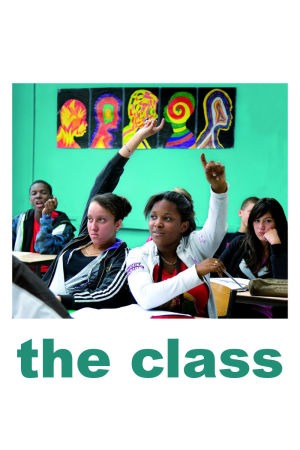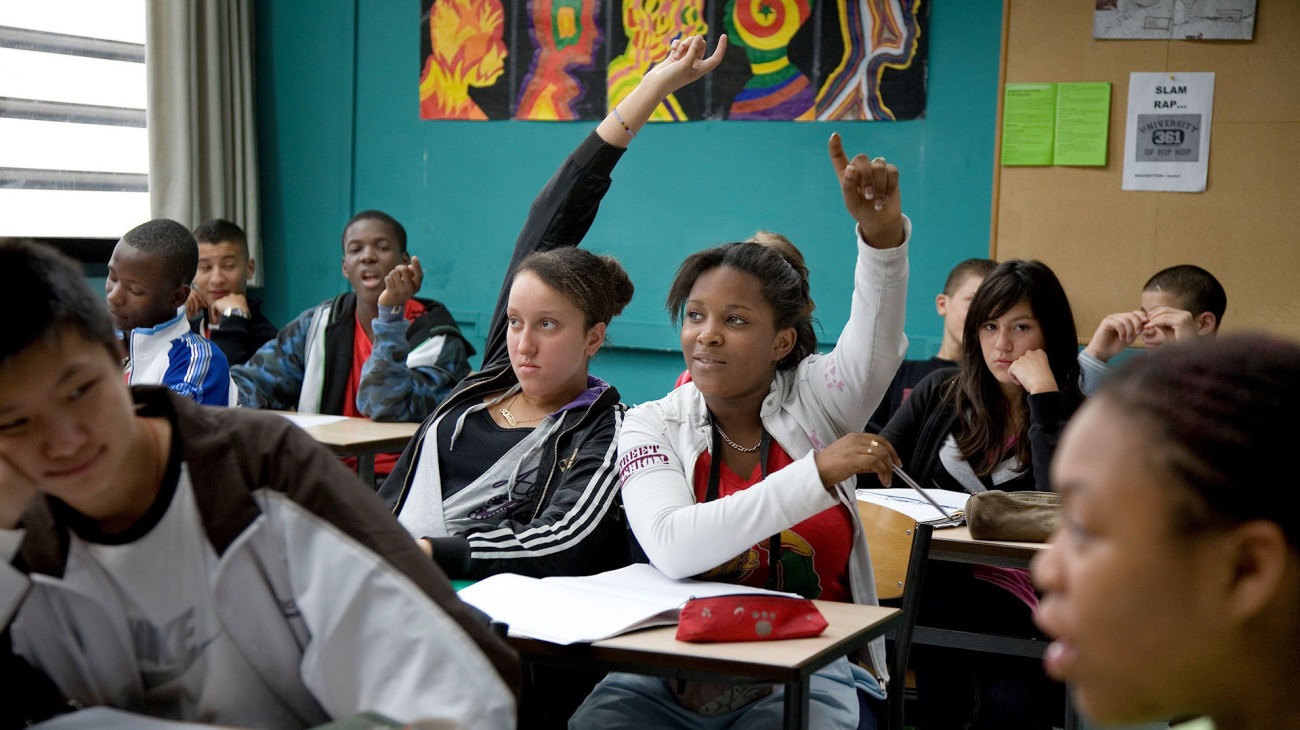
Dark sarcasm in the classroom
In Laurent Cantet's The Class (Entre les murs, or "Between the Walls" in the original French), there is a Parisian teacher named François who wants very badly to help his students become the smartest and best people they can be. Those students - 14 and 15-year-olds from a wide range of ethnic backgrounds - do not trust his definition of "smart" and "good", viewing him as nothing better than an outstretched figure of conformist society, determined to fashion them into drones.
If this were any other film - I shall not even say, "if this were an American film", as well-intentioned clichés know no nation - the story would end after the teacher had finally broken through with the students and led at least one of them into an epiphany of self-discovery. Everyone involved would be filled with the spirits of education, knowledge and inspiration (except, perhaps, the crusty old member of the administration who just doesn't understand the teacher's new methods). But The Class isn't any other film; adapted from his own book by François Bégaudeau (who also stars, as the teacher who shares his name), itself based upon his experiences as an educator, the film presents a much more dour, non-ponies-and-rainbows vision of what a well-intentioned teacher with a classroom full of bright kids who don't trust him can hope to achieve, and that's why at the end of the film the marvel isn't that François has taught these rough-and-tumble kids about truth and beauty, but that he hasn't screamed worse obscenities at more of them.
The most immediately apparent fact about The Class is its aggressively unpolished, pseudo-documentary aesthetic. You know the one, you've seen it plenty of times: lots of handheld camerawork, grainy footage, that sort of thing. So no, The Class wins no awards for imagination, although I'd be strongly tempted to claim that no film in the last few years has utilised this well-trod visual style to greater effect.
See, the remarkable thing about The Class, and part of what makes it feel so documentary-like, is how the entire thing plays out as little more than a series of fly-on-the-wall observations. There is, eventually, something like a plot, but for nearly all of its running time, the film simply perches in one of three places (François's classroom, or the office and lounge where the teachers commiserate and plan strategy), watches what happens, and then another scene begins. It is one of the most compulsively observant movies in recent memory, functioning mostly as a document of how one place functions over the course of nine months. If it has only the semblance of an arc, that is because events in life generally do not have much of a narrative to them until we look at them later on and pick out the bits that contributed to an overall forward movement. True, François is noticeably more tired at the end of the year than he was at the beginning; it is likely that is more tired than he was the year prior, and will be more tired still in the year to come. That's not a character arc, that's called "aging".
Driving him along his slow path to the grave as a man uncertain that he's achieved anything is one of the strongest casts ever to portray a high-school class. Working with Cantet, Bégaudeau, and co-writer Robin Campillo, the young people in the film - most of whom share the names of the students they play - workshopped their characters over the course of an actual school year, while the film was shot in the actual school where they actually go to study. It's a mistake to assume that this makes the film more "real" - by no account were the kids playing themselves - but it does make everything extraordinarily "lived-in": where most movie kids are The Reader, The Clown, The Jock, The Slut, and so on, the kids in The Class are people, instantly differentiated not because of the shorthand used to describe them, but because they are not the same as one another. And that is both the cause and result of a film that makes its subject the close study of human beings in a closed environment.
It could be said that the film has several meanings, and they are not all mutually compatible. Perhaps The Class is a tribute to beleaguered teachers all over the world who just want to do good by crude students who are too hormonal and impatient to give a damn about learning. Perhaps a sympathetic nod to all adolescents who want so much more than to repeat the existence of the higher generation. Being a French movie and all, perhaps it's a metaphor for how the white power structure attempts to "Frenchify" the many immigrants from hundreds of cultures flooding into that country.
I do hope my rhetoric was sufficiently leading: it's very much a film about all of those things, and yet I think the most satisfying way to watch it - at least the only one that doesn't instantly reduce the film to the role of sociopolitical position paper - is for the sheer human drama involved. All the people in The Class make foolish mistakes and have moments of righteous indignation; and whatever the film's ultimate conflict, everything is based in the tremendously universal problem when two people with different priorities and vocabularies fail to communicate with each other.
The Class won the 2008 Palme d'Or at Cannes, the first French film in 21 years to do so; but it hardly took the prize out of some embarrassed national desire to reclaim arguably the most prestigious award in cinema.** This is a remarkable motion picture, mostly without incident but bursting with messy humanity; its surface simplicity belies a great wealth of finely-tuned ideas about people and our actions that is rarely flattering, but always perfectly truthful.
9/10
If this were any other film - I shall not even say, "if this were an American film", as well-intentioned clichés know no nation - the story would end after the teacher had finally broken through with the students and led at least one of them into an epiphany of self-discovery. Everyone involved would be filled with the spirits of education, knowledge and inspiration (except, perhaps, the crusty old member of the administration who just doesn't understand the teacher's new methods). But The Class isn't any other film; adapted from his own book by François Bégaudeau (who also stars, as the teacher who shares his name), itself based upon his experiences as an educator, the film presents a much more dour, non-ponies-and-rainbows vision of what a well-intentioned teacher with a classroom full of bright kids who don't trust him can hope to achieve, and that's why at the end of the film the marvel isn't that François has taught these rough-and-tumble kids about truth and beauty, but that he hasn't screamed worse obscenities at more of them.
The most immediately apparent fact about The Class is its aggressively unpolished, pseudo-documentary aesthetic. You know the one, you've seen it plenty of times: lots of handheld camerawork, grainy footage, that sort of thing. So no, The Class wins no awards for imagination, although I'd be strongly tempted to claim that no film in the last few years has utilised this well-trod visual style to greater effect.
See, the remarkable thing about The Class, and part of what makes it feel so documentary-like, is how the entire thing plays out as little more than a series of fly-on-the-wall observations. There is, eventually, something like a plot, but for nearly all of its running time, the film simply perches in one of three places (François's classroom, or the office and lounge where the teachers commiserate and plan strategy), watches what happens, and then another scene begins. It is one of the most compulsively observant movies in recent memory, functioning mostly as a document of how one place functions over the course of nine months. If it has only the semblance of an arc, that is because events in life generally do not have much of a narrative to them until we look at them later on and pick out the bits that contributed to an overall forward movement. True, François is noticeably more tired at the end of the year than he was at the beginning; it is likely that is more tired than he was the year prior, and will be more tired still in the year to come. That's not a character arc, that's called "aging".
Driving him along his slow path to the grave as a man uncertain that he's achieved anything is one of the strongest casts ever to portray a high-school class. Working with Cantet, Bégaudeau, and co-writer Robin Campillo, the young people in the film - most of whom share the names of the students they play - workshopped their characters over the course of an actual school year, while the film was shot in the actual school where they actually go to study. It's a mistake to assume that this makes the film more "real" - by no account were the kids playing themselves - but it does make everything extraordinarily "lived-in": where most movie kids are The Reader, The Clown, The Jock, The Slut, and so on, the kids in The Class are people, instantly differentiated not because of the shorthand used to describe them, but because they are not the same as one another. And that is both the cause and result of a film that makes its subject the close study of human beings in a closed environment.
It could be said that the film has several meanings, and they are not all mutually compatible. Perhaps The Class is a tribute to beleaguered teachers all over the world who just want to do good by crude students who are too hormonal and impatient to give a damn about learning. Perhaps a sympathetic nod to all adolescents who want so much more than to repeat the existence of the higher generation. Being a French movie and all, perhaps it's a metaphor for how the white power structure attempts to "Frenchify" the many immigrants from hundreds of cultures flooding into that country.
I do hope my rhetoric was sufficiently leading: it's very much a film about all of those things, and yet I think the most satisfying way to watch it - at least the only one that doesn't instantly reduce the film to the role of sociopolitical position paper - is for the sheer human drama involved. All the people in The Class make foolish mistakes and have moments of righteous indignation; and whatever the film's ultimate conflict, everything is based in the tremendously universal problem when two people with different priorities and vocabularies fail to communicate with each other.
The Class won the 2008 Palme d'Or at Cannes, the first French film in 21 years to do so; but it hardly took the prize out of some embarrassed national desire to reclaim arguably the most prestigious award in cinema.** This is a remarkable motion picture, mostly without incident but bursting with messy humanity; its surface simplicity belies a great wealth of finely-tuned ideas about people and our actions that is rarely flattering, but always perfectly truthful.
9/10






